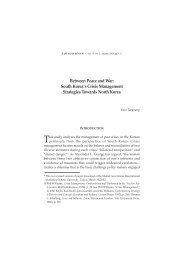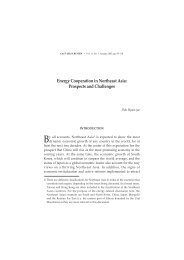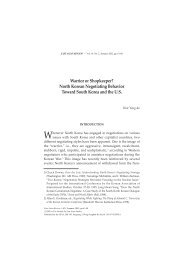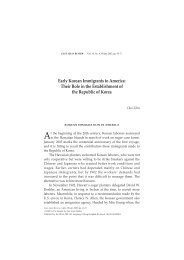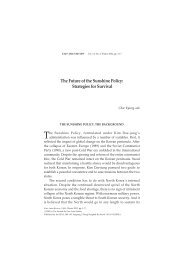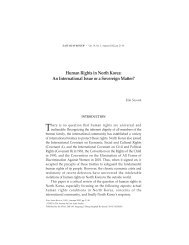Sino-Korean Relations since 1992 - the Institute for East Asian Studies
Sino-Korean Relations since 1992 - the Institute for East Asian Studies
Sino-Korean Relations since 1992 - the Institute for East Asian Studies
You also want an ePaper? Increase the reach of your titles
YUMPU automatically turns print PDFs into web optimized ePapers that Google loves.
4 EAST ASIAN REVIEW SPRING 2002<br />
bilateral relations to cover <strong>the</strong> areas of politics and military security.<br />
The most symbolic illustration of <strong>the</strong> move towards comprehensive<br />
cooperative relations between <strong>the</strong> two countries was <strong>the</strong> visit of a<br />
South <strong>Korean</strong> warship to Shanghai last October. Accordingly, <strong>the</strong><br />
two countries were able to improve <strong>the</strong> imbalanced structure of <strong>the</strong><br />
bilateral relations that have existed <strong>since</strong> <strong>the</strong> establishment of<br />
diplomatic relations.<br />
THE PROGRESS OF SOUTH KOREA-CHINESE<br />
DIPLOMATIC RELATIONS<br />
The establishment of diplomatic relations between South Korea<br />
and China in <strong>1992</strong> can be characterized as a product of China’s<br />
policy response to South Korea’s active nor<strong>the</strong>rn policy. The extreme<br />
antagonism between South and North Korea at <strong>the</strong> time left China<br />
with a limited policy choice: maintaining <strong>the</strong> <strong>for</strong>mer alliance with<br />
North Korea or establishing new friendly and cooperative relations<br />
with South Korea. In o<strong>the</strong>r words, China recognized that <strong>the</strong><br />
relations involved a zero-sum game in which maintaining both<br />
relations was impossible.<br />
Given <strong>the</strong> circumstances, China adopted a strategy of detour,<br />
minimizing damage to China-North Korea relations while<br />
normalizing its relations with South Korea. Although <strong>the</strong> conditions<br />
were ripe <strong>for</strong> establishing diplomatic relations with <strong>the</strong> South at <strong>the</strong><br />
time of <strong>the</strong> joint induction into <strong>the</strong> United Nations of both Koreas in<br />
1991, China maintained an indirect, passive policy to create a<br />
favorable environment <strong>for</strong> normalizing China-South Korea relations<br />
by placing priority on progress in North Korea’s relations with <strong>the</strong><br />
United States and Japan. However, with <strong>the</strong> likelihood of Clinton’s<br />
victory in <strong>the</strong> <strong>1992</strong> presidential election, China considered it unwise<br />
to maintain its strategy of detour, and thus, it reevaluated its indirect<br />
strategy.<br />
As a result, China shifted to employing a straight<strong>for</strong>ward



